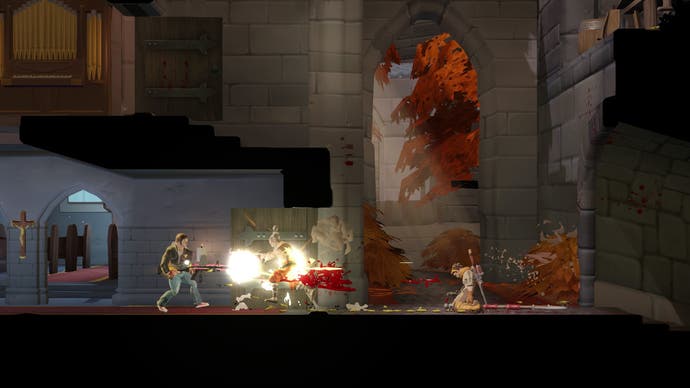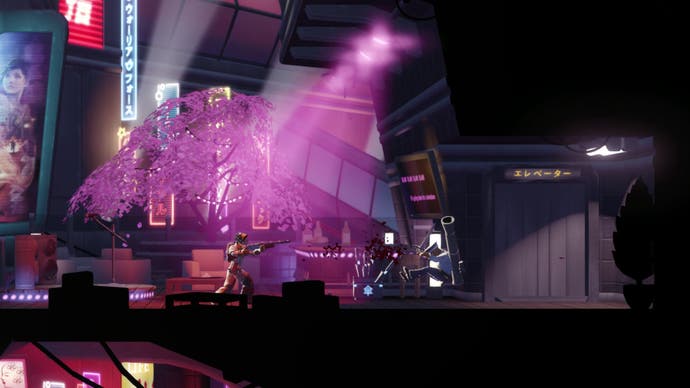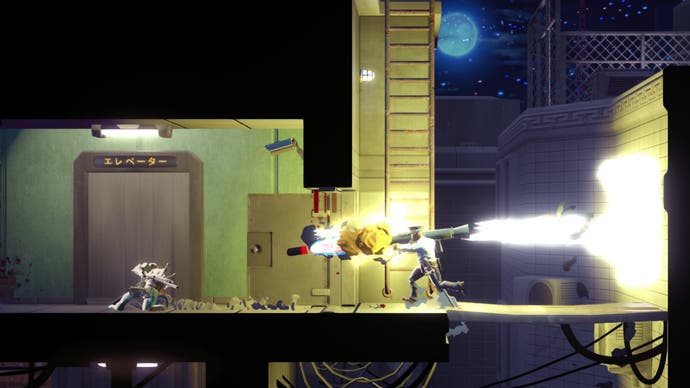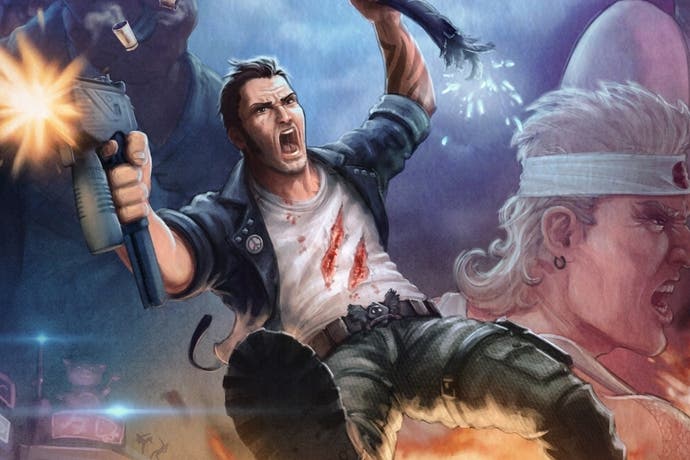The Showdown Effect review
This time it's personal.
Humans have been chasing and pretending to kill each other for centuries. What are traditional playground games like hide and seek, if not a way to exercise flight-or-fight instincts that have grown dull since we moved away from the wild and behind domestic barriers of brick and glass?
The modern video game deathmatch is simply the inevitable expression of that - made possible by technology, but not caused by it. The challenge to game designers is to find new ways to tickle that vestigial impulse, and the latest attempt to crack that nut comes from Arrowhead Studios, creator of wizards-with-guns indie hit Magicka.
The Showdown Effect is what happens when Quake runs into Super Smash Bros. at high speed in the aisles of Blockbuster Video, circa 1987. A fast-paced 2.5D multiplayer game in which you jump, tumble and run around a maze-like map slaughtering up to seven other players, it takes the simple thrill of the chase and dresses it up in action movie clichés.
This is clearly a game designed to be expanded in the future, but for now you get eight cartoonish characters. Four are available from the start, including an Arnie clone and a samurai schoolgirl, with four more being unlockable once you've earned enough points. Characters wield both firearms and melee weapons and each has their own special ability which triggers with a corny movie quip. All sorts of items in the environment can also be picked up and used as a shield or a thrown weapon. At present there are just four maps, two set in a cyberpunky Neo-Tokyo and two set in a medieval fortress.

Customisation is also a large part of the game, with a slew of unlockables, from weapons to costume items, and variable game rules all accessed by cashing in the points earned in matches. Micropayments are used but, wisely, only for cosmetic additions. The prices are a little steep, but if someone is happy to pay a couple of quid to make a machine gun look like a Gatling gun without any attendant gameplay advantage, then that's between them and their wallet.
At its best, The Showdown Effect is twitchy, knockabout fun - but, as with Magicka, the effort required to get to the good stuff can be off-putting at first. Control feels unusually stiff and gluey for such an arcadey game, with jumps taking flight after a distracting delay and lateral movement subject to slippery momentum. This is especially problematic when trying to interact with items, as it's easy to keep skittering past them, while wall-jumping to higher levels is more clumsy than it needs to be. The genre demands effortless and graceful movement, but The Showdown Effect keeps tripping over its own feet.
Also tangling things up are the controls. As well as the directional controls, there are buttons for all sorts of other functions. One for blocking, one for healing, one for collecting, one for switching weapons, one for reloading, one for diving and double taps for rolling to either side. There's a button to hold down for throwing while the mouse does the aiming. The right mouse button also puts you into a precision aiming mode, extending your view of the level at the cost of movement speed. It's a lot to grapple with in a relentless game where death comes in a matter of seconds, but there's no option for using a more arcade-friendly controller.
The Showdown Effect is what happens when Quake runs into Super Smash Bros. at high speed in the aisles of Blockbuster Video, circa 1987

That's because The Showdown Effect's big idea is accuracy. Unlike its console peers, you can't simply point in the direction of another player and shoot. You have to hold your aiming cursor over them for the bullets to hit. It automatically raises the skill required to succeed - no bad thing in itself - while ensuring that the game will only ever work with the rather convoluted keyboard-and-mouse set-up. That's preferable for an FPS, certainly, but is rarely a comfortable fit for a similarly frantic multiplayer game played in two dimensions, especially one with so many buttons to map.
Thus, encounters with other players quickly fall into a handful of categories. One is that players hop around each other, firing frantically until someone dies. Another is that someone rushes up to you with a melee weapon and kills you instantly while you're left firing ineffectually at thin air. The third is that you just get killed from off-screen by someone nearby. The prospect of finding a quiet spot to squat and heal is both essential to long term success, but also unlikely. You will die. A lot.
This is a game that is brutally unwelcoming to new players. The tutorial consists of nine static dummies that must be found and destroyed. This teaches you the basics of getting around, but for the rest of the game's functions - the stuff you'll need to master in order to start claiming scalps - it's a basic text explanation and then the uphill struggle of learning while you die.

Also adding speed bumps to the experience are the servers, or rather the lack of them. The Showdown Effect uses peer-to-peer connections for its matches, which has led to some less than consistent performance, to say the least. In a game that rewards pinpoint accuracy in fast-paced encounters, the perils of a wobbly ping can't be understated.
It's a game bursting with promise, but one that needs balancing and tightening to reach its true potential. To its credit, Arrowhead Studios is actively engaging the community on the game's forum and openly considering a move to dedicated servers. That's to be expected from a developer which took the bug-riddled Magicka and turned it into a hit without pissing off its players, but it makes The Showdown Effect a tricky game to recommend out of the gate.
Some will fall in love with its goofy adolescent humour and sink-or-swim gameplay. If you can wade through those early matches long enough to make peace with the controls, and find yourself in a match with like-minded players (or better yet, actual friends), it can be ridiculously good fun. It too often feels, however, that praise is due more to the game The Showdown Effect is trying to be rather than game it currently is.

